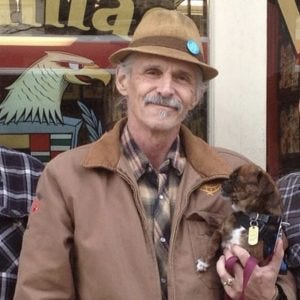Eric Inksmith now works in the longest-running tattoo shop in Jacksonville, Fla. but he grew up in a traditional American Jewish community, the Squirrel Hill section of Pittsburgh, right down the block from the Tree of Life Synagogue.
He’s spent nearly 50 years tattooing, but it was a third career for him. Inksmith was, for more than a few years, a successful dental technician. Before that, a social worker.
He was, perhaps, attempting to fit the mold set for him.
“I started out as a social worker and did what a good Jewish boy was supposed to do,” Inksmith said. “My whole family was professional. My grandpa was a doctor. My mother was the president of the National Council of Jewish Women. My father was a merchant.”
But even as a child, Inksmith was drawn by what he called “the dark side.”
“I was always fascinated with tattoos, always fascinated, and I couldn't reveal it, because of the stigma amongst our people at that time,” he said. “The first tattoo I saw captivated me. I was in summer camp in the state of Maine, on a canoe trip and I guess I was maybe 11 and there waS staff member, Lenny Loselle -- how's that for a memory -- he had this beautiful elbow-to-shoulder, to me it was beautiful, black-and-gray rock of ages. I stared at it for hours because he was in front of me in a canoe.”
His father sold televisions in downtown Pittsburgh, and Inksmith would go to work with his father on the weekends. Up the street from his father’s shop, House of Television, was an arcade, and in the back of the arcade was a tattoo artist.
“He wouldn't let me in. It was an all-glass front in the back of the arcade.Of course he wouldn't let me in, I was just a kid,” he said.
But he’d pretend to play pinball and watch through the glass, later drawing those designs, like bloody daggers, in school and getting in trouble for it, Ms. Perlman calling home to talk to his mother.
“I actually had to go to a psychiatrist,” he said. “I had to confess where I got the images because they thought I was dreaming this up.”
By 1969 he’d left the Air Force and been married, and intensely disliked his chosen profession: “I'm out of the service, a social worker and hating it, and rushing home from work to do wood carving, and wooden inlaying wood and refinishing guns.”
He’d been tattooed up in Toronto, while visiting his then girlfriend, soon-to-be first wife.
“There was a tattoo shop and I went to the tattoo shop and got a tattoo on my hip where mom and dad would never know I had a tattoo,” he said. “I figured for sure, I'm gonna get a great dragon. It was terrible. It was heartbreaking. I knew the heartbreak of a really bad tattoo, and it was a really bad tattoo.”
On a whim, Inksmith went to Chicago and ended up turning down an apprenticeship with famed tattoo artist Cliff Raven. “He said, there's no money at all for a year. You got to support yourself. And he explained to me whether it's a real deal, old school apprenticeship. I said I have a wife.”
But social work was not the right fit. Inksmith needed to work with his hands, to “make some kind of a living with what satisfies my soul and and still be an acceptable profession and also be a good living.”
So he chose dental technology: “Crown and bridge, mainly ceramic and gold.”
Inksmith did well as a dental technician. By then it’s the mid-1970s. A little boy was born, and the family moved down to an island off the coast of Georgia where everything fell apart. His boss went bankrupt. His wife of 10 years “didn’t want to be a parent.”
“My job is an hour and a half away in Savannah, Georgia, and I live in St. Simons Island,” he said. “I would get home from work exhausted. She'd snatch the keys and she'd be out all night, and I’d pray that she’d get home in time in the morning so that I could get the keys from her and drive back to Savannah.”
Needing a lawyer, Inksmith said he picked the one Jew in the phone book, Bernard Grossman.
Grossman, who Inksmith described as “a real hustler,” did more than help him file for divorce. The two hit it off, and Grossman set him up as a dental technician in a spare room in an old Victorian mansion.
For a while, “it was beautiful,” he said. “One month later, I paid cash for a ’72 Corvette.” but that, too, would go sour. “Little did I know that he was manic depressive. I hit him on his manic phase.”
Bernie left town, and being a dental technician had become repetitive. “The drudgery was 16 teeth and the mirror image of those 16 teeth. That's your design, and that's all you ever do.”
He needed a hobby. It was a choice between tattooing and engraving, and the tattoo set was cheaper, which he ordered from Huck Spaulding. Over the phone, Huck talked Inksmith through his first tattoo, a butterfly on a girlfriend’s shoulder.
“Before I was done, it was like the light bulb event. I love this,” he said. “This is what I’m meant to do. I finally found it.” Inksmith was 34 years old. “I really think I had to go through all that other stuff to really appreciate what tattooing was about. I worked so many different jobs: landscaping iron, steel, warehouse, short order cook.”
He’s been tattooing ever since. Inksmith turned 80 this year.
“My life has been a series of crazy adventures,” he said.




